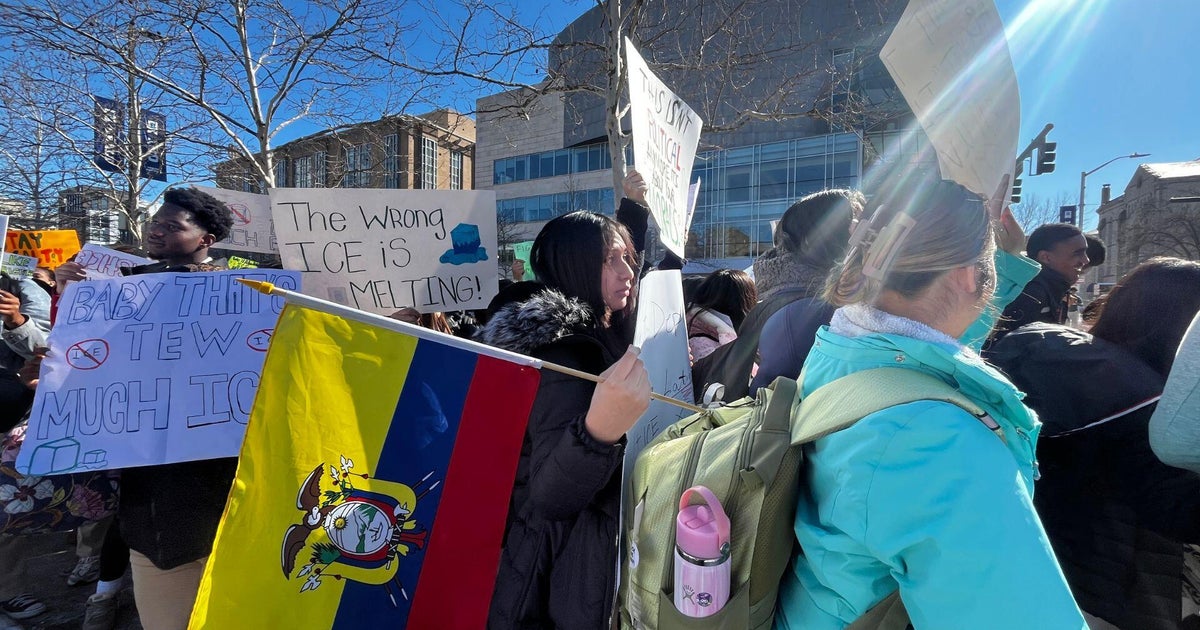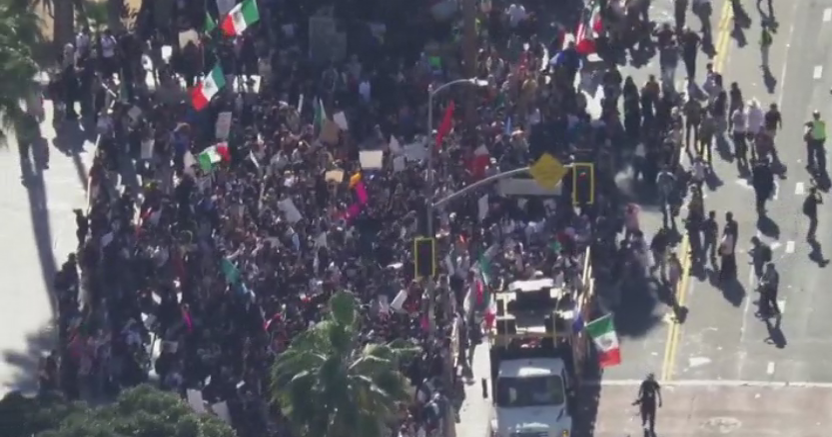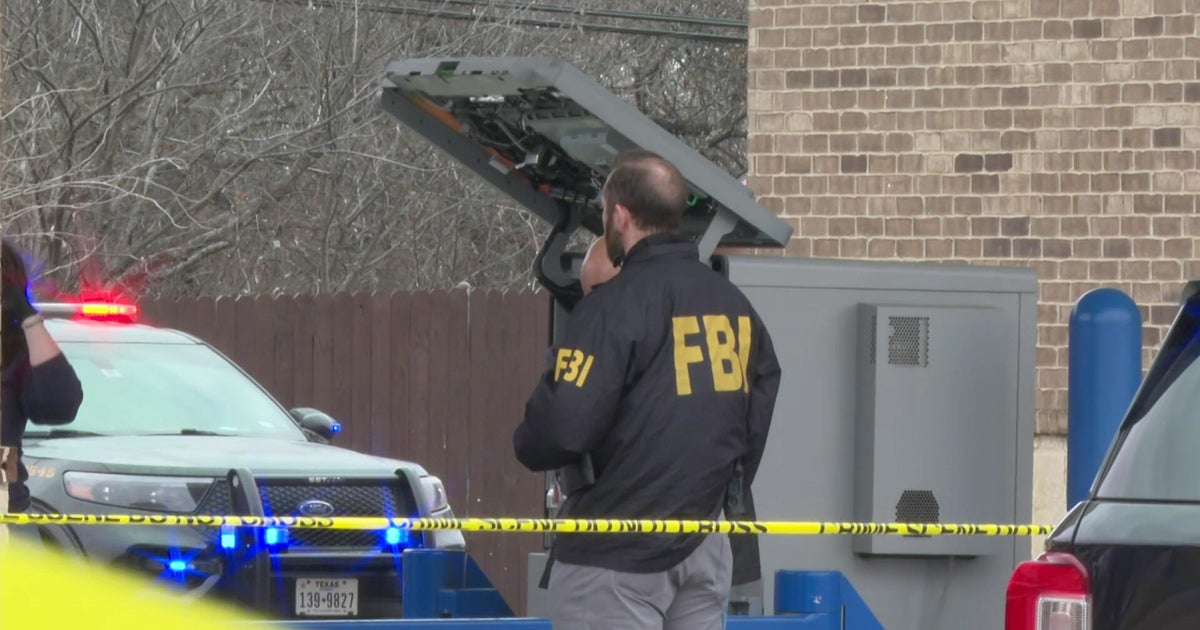Remembering Tiananmen Square
CBS News Correspondent Richard Roth was in Tiananmen Square during the 1989 military crackdown on the pro-democracy protesters in Beijing. Roth and cameraman Derek Williams were taken into custody by the military during the demonstrations. The following excerpts from Roth's journal provide a rare personal glimpse of the historic event:
Saturday, June 3
Three hours of sleep. In office Saturday morning. Hear that camera crews have been "routed." Chinese army forces on outskirts of city - disheveled, separated from units. But there's also an angry demonstration growing outside the government compound downtown, Zhongnanhai. Huge crowds, protesting troop movements of night before. Also big crowds outside Great Hall of the People, where some troops have been spotted. As day wears on, tear gas is used on crowd at Zhongnanhai. Some angry confrontations and beatings. But it doesn't amount to much. Out and back with a crew. Can't really figure out just what's up - though more rumors flying this afternoon than ever before. Thinking about tonight's Evening News piece but don't have a handle on it yet. Late afternoon reports begin coming in of large-scale troop movements south of city and west. We pull out maps and begin plotting where we hear the troops and convoys are.
I go to my room to put on a fresh shirt. Also dump most of the stuff from my shoulder bag to lighten it. Am thinking - don't know why - of what happened in Panama a year before, when troops stormed the room where I was working, stole my gear: camera, army knife, calculator, etc. from my bag, and held cameraman and me for a couple of hours. Decide to carry just some I.D., passport, tape recorder, camera, couple things like that. And of course the cellular phone.
7:30 p.m. Large onvoy stopped at Friendship hospital. We grab a few shots but nothing great. They are stopped of their own accord - not because citizens massed in streets.
8:37 p.m. Twenty trucks stopped to north by mob of people. Lisa (one of our assistants, an American studying in China) says student leaders in square are warning demonstrators to prepare for an attack by the army.
8:42 p.m. Soldiers have overrun one blockade. Chopper over square. We keep encountering roadblocks and must detour toward Tiananman Square.
9:00 p.m. Dozens of troop carriers coming up from south, now rumors of an agreement between students and government. Lisa in Square says students coming in from south with stories of fighting troops.
9:40 p.m. We get to Tiananman Square, which for all the commotion around it, is relatively peaceful. Derek sets up his camera at the center, at the monument, and wait for we don't know what. Perhaps ten other hacks there. We trade gossip. Some kids come in with a military vehicle license plate, a soldiers helmet and two bayonets. Another kid, blood on his hands. They tell stories of clashes with troops to south and west.
Loudspeakers' battle: student speaker playing "Internationale" or rousing political speeches. Government speakers on periphery warning the Square will be cleared - by whatever means necessary. Warning martial law decree in effect. Can see there are blockades now set up by students at three of the four corners of the Square, visible from where we are.
Derek [cameraman] and I begin talking in earnest about what our plan is or ought to be and neither of us really has a clue. We have the best vantage point right now, on the monument, surrounded by the demonstrators' encampment. But the worst place to be in terms of safety if there's an assault: we are the bull's eye in the target. We feel - or at least I sure do - terribly exposed. This kind of time is the worst: aware of competitive pressure to get the best position and fear of being beaten on the story. Aware of the fear beginning to build that our position is too good - that is, too close. Which fear is greater?
Sunday, June 4
After midnight - an APC [armored personnel carrier] races through the Square suddenly and with no warning from left screen to right - from south to north along the west side. So the army can run the blockade if it wants to. Gunfire can plainly be heard now from the south. Crowds of people run to the southwest corner, from where the APC came. We decide to move, cautiously, with them.
Get a few hundred feet off the monument and tracers begin lighting up the sky to our left, to the south. I'm calling New York as I'm moving, trotting, crouching, slightly winded. Describing what I see - New York puts me on the air, and all I have to do is describe what's going on in front of me. And watch out.
Cat and mouse for hours. Several columns of troops enter the edge of the Squar, or from behind, the Great Hall of the People. We are outside the Hall, right at the corner of the Square. Unobstructed view. Lots of troops, including paratroops with fixed bayonets. Some injured. Tell Lisa I fear this is becoming hazardous; she ought to go back to hotel. She's not expected to take the kind of risks others of us do in the course of our jobs. I don't think for a minute she'll leave, but if she has any doubts, I want to try to convince her she should not be staying for us. She of course stays. We start breaking out tapes quickly - soon as we've got some pictures - and send them to the car to be hidden.
Cell phone batteries running low. I tell New York. Tell them I will not keep the line open, but will phone when there's news - or to meet their scheduled broadcasts.
Two-way radios now useless. Batteries no good.
Peter shows up - New York's asked him to get me batteries, and he's come himself. What he wants to tell me is that - from reports they've been able to piece together - it's clear an assault is imminent, it's going to be major, backed by artillery and tanks. He's asked New York to pass on warnings to me, but a N.Y. producer, Peter says, has replied that 'Roth has all the information he needs.' I tell Peter I think we're in a prudent position and will be able to judge when/if we need to move further back. We have all performed the ritual dance now, and everyone has played his part on cue.
4 a.m. Lights go out in Square. Announcement on government loudspeakers: the martial law command has decided to clear out the Square now. Lots of troops around us now. We're now near the public toilets, where the stench is just horrible. Finally move across small street, to side of Great Hall. Derek and I are standing on a 2-3 foot high concrete "curb," which forms the base for the iron fence around the building. We can hang on with our left arms, and look over the heads of the crowd into the darkened square.
4:15-4:45 a.m. Column of troops is moving from behind us, then alongside of us, heading toward Square. I call New York, still hanging onto fence, and tell Lane Vernardos [at CBS News in New York] something's up. He asks if it's time to break into programming for a Special Report. Not yet, I think, but it's close enough that now we want to keep the line open. Unknown to me he decides to roll a tape on our phone conversation.
Can see over Derek's shoulder in the dark distance that a large group of demonstrators is marching slowly around the monument, led by some students carrying a huge white banner (cannot see what's written on it) and apparently EXITING the Square to the south. I am wary of describing too much to New York on the phone - because I don't know it's significance, and don't want to be put on the air only to blather on and on. Then I'm distracted by what's happening right in front of me: a squad of soldiers has broken-away from the column moving into the square, and several of hem are reaching for Derek, yanking his camera cable then his camera - pulling it off his shoulder. I begin to describe it into the phone, believing I'm ONLY talking to the New York control room, as I jump down from the wall:
"OK we've got to get out of here. They're just going after Derek." I'm on the ground now, trying to move backwards as I keep my eyes on Derek. I'm wondering what can I do - can I help him? I don't at that instant sense there's a direct threat to me - unless I intervene. But it seems to me intervention is hopeless. In a second, I'm relieved of the burden of indecision. "They're ripping away his camera and they're coming for us. We're trying to move back and move away." Two soldiers have Derek now and four are stepping toward me, pushing aside civilians and reaching for me. I take a couple of small steps back and find myself tangled in a bunch of bicycles, falling backwards against the bikes, trying to get my balance - when one of the soldiers pushes me. I tumble into the bikes and I'm trapped. "I'll go, I'll go, I'll go." I'm screaming to the soldiers now, trying to do several things simultaneously: right myself, show that I'll leave without a struggle and - I'm focused on this - try to comport myself so I'm shielded if possible from their clubs: heavy, wooden sticks that a couple of the soldiers are brandishing.
They all carry automatic weapons, but it's the clubs I fear - I've seen people in too many places beaten with such sticks. I'm trying to right myself. Two of the soldiers start kicking me in the legs, around the thighs. I finally let go of the phone, which I had been holding in my right hand. I'm still grasping my shoulder bag strap in my left hand. Two soldiers yank me upright. I stand for just a moment when a third soldier standing, facing me, looks at me a moment - then throws a left hook at me, knocking off my glasses and knocking me down again.
Now for moment things seem to move in slow motion, a cliche. I hear gunfire - and realize soldiers are firing in the air to keep back civilians trying to rush to our aid. I think, 'I'll look down and see blood on my shirt'; I do and it's there. I think, 'now I'll raise my hand to my eye and there will be blood.' I do and there is. I think for a moment about trying to pick up my glasses, when a pair of soldiers pull me up by the arms, and start dragging me away from the Square, up the driveway toward the Great Hall of the People. It's about a seventy-five yards and I'm being dragged at a fast run.
As we approach the crest of the driveway, under the portico, I see Derek standing under guard. I'm pulled past him. We stop in front of some soldiers - apparently officers. My bag is yanked away from me - the officers say something, and I'm dragged back to where Derek is standing.
I cannot catch my breath, cannot talk. And anyway it doesn't seem wise to try. But after a moment, Derek asks if I'm okay and I say I think so. So is he.
A woman stands with us - fortyish, long dark hair. Jeans. American. Her first words strike me as absurd: she tells me I look hurt and ought to get my eye attended to. I'm tempted to thank her and say I will as soon as I get a moment, but I just pull out my handkerchief to stop the bleeding. I have no idea what will happen next. I'm feeling relieved I wasn't badly beaten - that is, nothing hurts horribly - and anxious about whether we'll be shot. I don't think so. Derek says Dexter got away in the crowd and so did Rob and he thinks Lisa. But the army got my camera, he says. An officer comes to face us. He looks at my eye - gives an order to a soldier - and walks away. A young medic comes, with a couple of small tin pots in one hand, little cans like Sterno cans, some gauze, and a pair of scissors. He looks at my eye, then using the scissors like a pair of forceps, swirls some gauze in one of the pots and daubs something on my cheek and eye - couple of applications from several of the pots, stuff that smells like camphor or menthol and stings like mad. He leaves and the woman says to me - you really ought to have some stitches. Then the shooting begins.
The noise is tremendous: automatic weapons fire and what sounds like tank fire or artillery. We can look to the left, toward the Square, and see flashes of light - but cannot see through trees and bushes into the Square. It lasts a couple of minutes, and I think it's vaguely like a fireworks display.
It ends and we begin to chat sotto voce. The woman tells us she's Valerie S. from California. She's been studying music in Beijing, and was picked up just before we were - as she was using her camcorder in or near the Square. She is in China with her 12-year-old son, whom she left in the care of a friend Saturday night when she went out to take pictures. She speaks Mandarin. She asks us what we think will happen. Derek and I look at each other, and say we don't know - though I'm now thinking the worst is probably over, and I add it's my guess they'll just let us go. I'm wondering how I'll get back my bag. I'm finally catching my breath.
Two jeeps pull up. We are hustled down the steps - and Valerie and Derek are put in the lead jeep, I'm put in the second - in the back seat, with soldiers on either side, and an officer in the front passenger seat next to the driver.
5:45 a.m. The jeeps pull out - swing around the street in front of the great hall and the Square. It's just dawn. Grey sky suffused with smoke. Thousands of soldiers in the Square, many of them sitting cross-legged in ranks that snake this way and that around what was the pro-democracy encampment. We drive past the monument. There are piles of debris, some of it still smoldering, but no tents standing. The Goddess of Democracy statue is a pile of rubble. Some soldiers pushing at the debris, sweeping it. Six or eight APC's lined up. Six tanks. Couple of artillery pieces. Jeeps. Troops. One camera crew - Chinese, clearly - near the center of the Square. NO BODIES, as far I can see. No odor of tear gas. Many of the troops salute the officer in my jeep. A lot of brisk, shouted good cheer - Don't know what the words meant, sound of it was like "good job, men. Well done!" But if there was a "massacre" here, in this place, where are the victims?
We are driven clear across the Square, across Chang-an Avenue, and stop beneath the portrait of Mao at the gates to the Forbidden City. The gates are opened - I'm thinking this is just like a scene in the Last Emperor, and I'm finally going to get to see the Forbidden City - which has been closed to tourism.
6:15 a.m. The gates swing open and we drive inside to a small park that's been turned into an army garrison. Out of the jeeps. See some prisoners being led, heads down, by soldiers. They've obviously been beaten. We say nothing. Back into the jeeps. Driven few hundred yards to a group of one-story buildings. Led into a room 10 feet by 10 feet. Windows on sides. Concrete floor. Couple benches. 6-8 chairs, plain wood and metal.
A procession of soldiers and police looks in on us, but no one says anything. Finally a man in civilian clothes with bearing of authority comes in and right up to me. Looks at my eye. Says something in Chinese and walks away. I ask Valerie what did he say. "Not serious." Probably right, I think, but not terribly considerate.
One guard with us. We begin to try to chat with him. He's surprised Valerie speaks Chinese, but he's wary of talking - and so, it seems, is she. She keeps asking Derek and me what'll happen. We tell her to ask him. She does and he shrugs. He apologizes there's no water for us to drink - the water supply is contaminated, he says.
Civilian-dressed man comes back with some others. He sits down and begins lecturing us. Valerie translates a bit. Basically he tells us we should know that martial law has been in effect, that we should not have been out, and that foreigners must respect the laws of China. Lots of gunfire audible in distance beyond walls.
NOTE: Roth and the others were held for 20 hours, questioned and then released.
1999 CBS Worldwide Corp. All rights reserved. This material may not be published, broadcast, rewritten, or redistributed.



